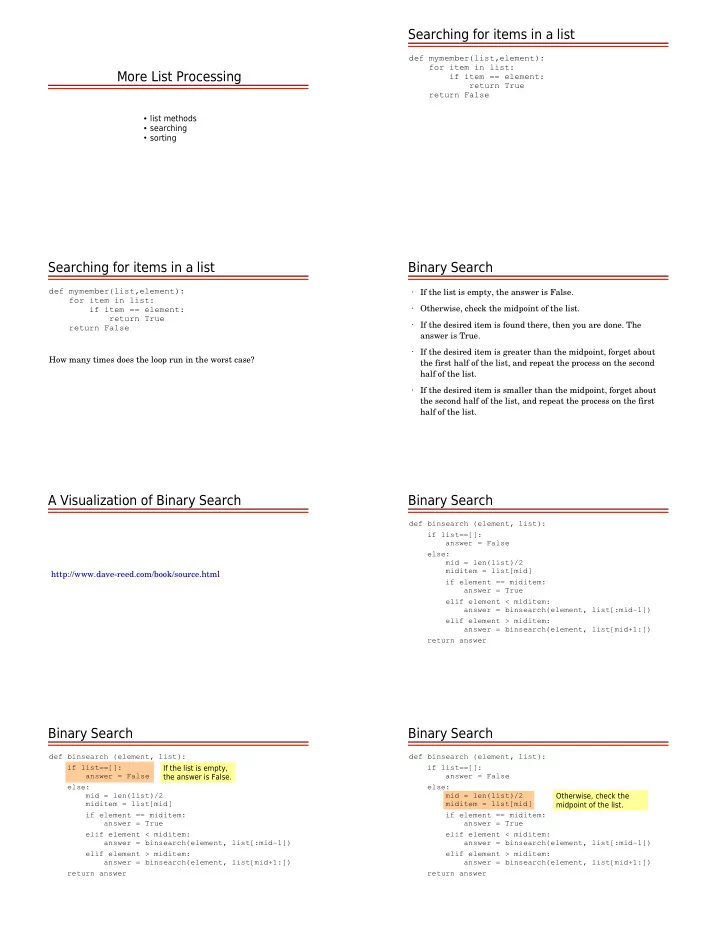

����������������������������� def mymember(list,element): for item in list: �������������������� if item == element: return True return False � ������������ � ��������� � ������� � � � � ����������������������������� ������������� def mymember(list,element): If the list is empty, the answer is False. � for item in list: Otherwise, check the midpoint of the list. if item == element: � return True If the desired item is found there, then you are done. The � return False answer is True. If the desired item is greater than the midpoint, forget about � How many times does the loop run in the worst case? the first half of the list, and repeat the process on the second half of the list. If the desired item is smaller than the midpoint, forget about � the second half of the list, and repeat the process on the first half of the list. � � � � �������������������������������� ������������� def binsearch (element, list): if list==[]: answer = False else: mid = len(list)/2 miditem = list[mid] http://www.dave-reed.com/book/source.html if element == miditem: answer = True elif element < miditem: answer = binsearch(element, list[:mid-1]) elif element > miditem: answer = binsearch(element, list[mid+1:]) return answer � � � � ������������� ������������� def binsearch (element, list): def binsearch (element, list): ��������������������� if list==[]: if list==[]: ������������������� answer = False answer = False else: else: !��������������"����� mid = len(list)/2 mid = len(list)/2 miditem = list[mid] miditem = list[mid] �������������������� if element == miditem: if element == miditem: answer = True answer = True elif element < miditem: elif element < miditem: answer = binsearch(element, list[:mid-1]) answer = binsearch(element, list[:mid-1]) elif element > miditem: elif element > miditem: answer = binsearch(element, list[mid+1:]) answer = binsearch(element, list[mid+1:]) return answer return answer � � � �
������������� ������������� def binsearch (element, list): def binsearch (element, list): if list==[]: if list==[]: answer = False answer = False else: else: ����������������������� ������� � mid = len(list)/2 mid = len(list)/2 ���������������������������$���� miditem = list[mid] miditem = list[mid] ��������������������������������� ������������������������������������ if element == miditem: if element == miditem: ���������������������������������� ������������ �#�������������#��� answer = True answer = True ���������������� elif element < miditem: elif element < miditem: answer = binsearch(element, list[:mid-1]) answer = binsearch(element, list[:mid-1]) elif element > miditem: elif element > miditem: answer = binsearch(element, list[mid+1:]) answer = binsearch(element, list[mid+1:]) return answer return answer � � � � ������������� ������������� def binsearch (element, list): def binsearch (element, list): if list==[]: if list==[]: answer = False answer = False else: else: mid = len(list)/2 mid = len(list)/2 miditem = list[mid] miditem = list[mid] ���������������������������% ����������������������� ������� � if element == miditem: if element == miditem: ���������������������������$���� answer = True answer = True ��������������������������������� elif element < miditem: elif element < miditem: ���������������������������������� answer = binsearch(element, list[:mid-1]) answer = binsearch(element, list[:mid-1]) ���������������� elif element > miditem: elif element > miditem: answer = binsearch(element, list[mid+1:]) answer = binsearch(element, list[mid+1:]) return answer return answer � � � � ��$$������� �������������� Compare the first and the second element of the list and swap If the list is empty or has length 1, there is nothing to sort. We � � them if the first is greater than the second. are done. Do the same for the second and third element, the third and Otherwise, find the smallest element in the list and swap it with � � forth element, and so on until you reach the end of the list. the first element. Repeat the whole process until you go through the list without Then repeat the process with the rest of the list. � � making any swaps. � � � � �������������� ���������������,�������������� Take the list to consist of a sorted part and an unsorted part. � � & & ( &' ' +& +& * ') & & ' ( &' +& * ') In the beginning, the sorted part is the slice from position 0 to � position 0 and the unsorted part is the rest. “Remember” the first element of the unsorted part. Let's call it � & & ' &' ( +& +& * ') toInsert . ������ �������� Compare toInsert to the elements of the sorted part one by � Take the first element of the unsorted part and insert it into the one starting from the right. � sorted part. While the element of the sorted part is greater than toInsert, � & & ' &' ( +& +& * ') & & ' ( &' +& * ') shift it one step to the right. Repeat this last step until the sorted part spans the whole list When the element of the sorted part is smaller than toInsert, � � and the unsorted part is empty. insert toInsert to the right of that element. � � � �
Recommend
More recommend